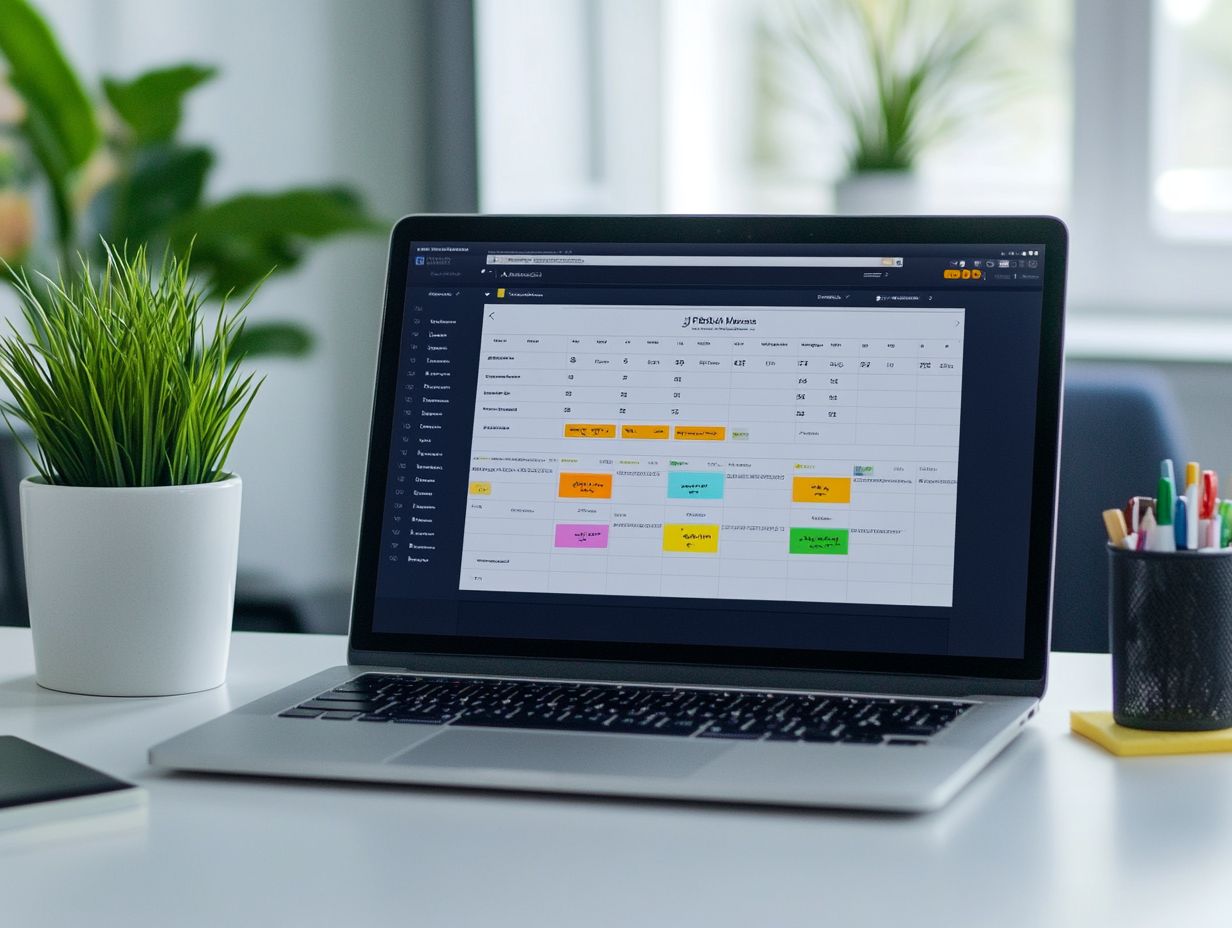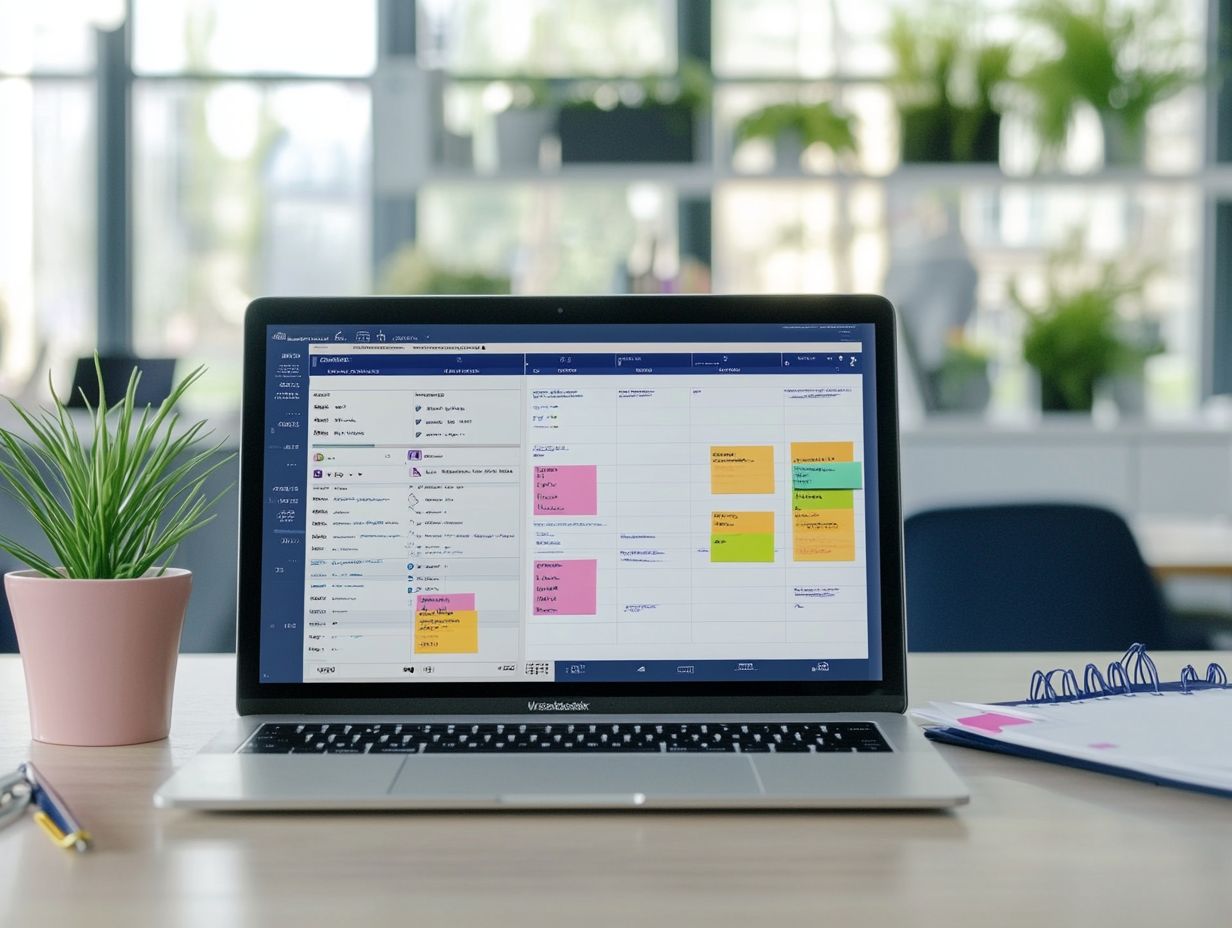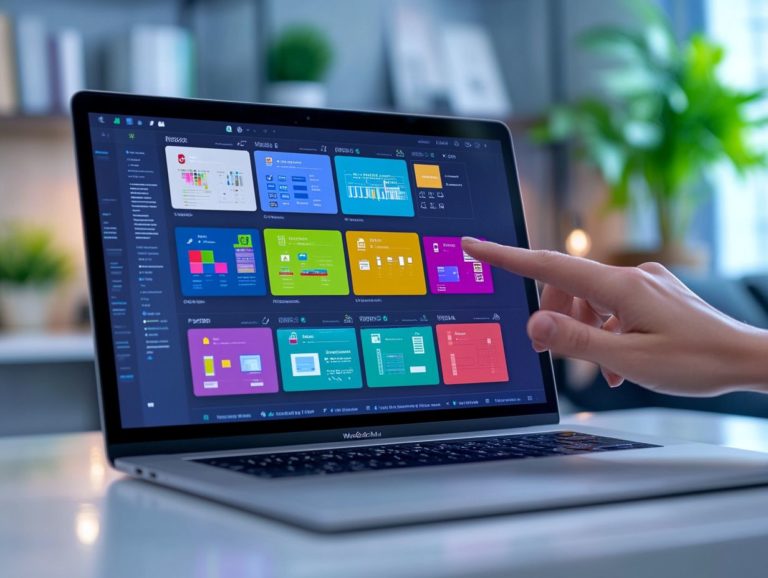51. 5 crucial integrations for event project management
Planning an event can feel overwhelming, but with the right strategies and tools, it can transform into a seamless experience.
This article delves into five essential integrations that will elevate your event project management. By automating registration and ticketing and managing your budget efficiently, you can save valuable time and enhance collaboration among your team.
Leveraging social media amplifies your marketing efforts. Discover these key components now to transform your next event!
Contents
- Key Takeaways:
- 1. Automate Registration and Ticketing Processes
- 2. Manage Event Budget and Finances Efficiently
- 3. Coordinate with Vendors and Suppliers
- 4. Utilize Project Management Tools for Team Collaboration
- 5. Integrate Social Media for Marketing and Promotion
- What Is Event Project Management and Why Is It Important?
- What Are the Key Components of Event Project Management?
- How Can Automation Help with Event Registration and Ticketing?
- What Are the Benefits of Using Project Management Tools for Event Planning?
- How Can Integrating Social Media Help with Event Marketing and Promotion?
- What Are Some Other Useful Integrations for Event Project Management?
Key Takeaways:

- Streamline event registration and ticketing processes by automating them. This saves time and reduces human error.
- Manage your event budget and finances effectively by using financial tools. This ensures a successful and profitable event.
- Coordinate with vendors and suppliers by integrating communication and payment systems, improving efficiency and accuracy.
1. Automate Registration and Ticketing Processes
In the world of event planning, automating registration and ticketing processes is crucial. This creates a seamless experience for both you and your attendees.
By harnessing registration and ticketing systems, you can streamline your operations and enhance attendee tracking. Minimizing human error contributes to the success of your events.
Automation tools save you time. They also boost attendee engagement and satisfaction by offering a hassle-free registration experience.
Whether you choose popular platforms like Eventbrite or comprehensive solutions like Cvent, these systems integrate multiple functions into one cohesive platform.
They come equipped with features such as customizable registration forms, real-time analytics, and group ticketing. This enhances the overall efficiency of your event management.
Automating communications like confirmations and reminders ensures your attendees are well-informed. This sets the stage for a more organized and enjoyable event.
This shift toward automation aids in accurate data collection and frees up precious time for you to focus on creating memorable experiences.
2. Manage Event Budget and Finances Efficiently
Effectively managing your event’s budget and finances is crucial. This choice shapes the success of your entire event!
By adopting a structured approach to cost estimation, you can pinpoint all potential expenses early on. This establishes a clear financial framework.
Regularly tracking your expenses allows for timely adjustments. This minimizes the risk of overspending and ensures your budget aligns with initial projections.
Analyzing spending trends provides valuable insights into past expenditure patterns. It highlights trends that can inform your future budgetary decisions.
Tools like budgeting software and expense trackers significantly streamline your financial oversight.
Additionally, incorporating customer feedback can guide necessary adjustments. This enhances attendee satisfaction and optimizes your spending.
Ultimately, these strategies enable you to make data-driven choices. This leads to a more effective use of resources and improved event outcomes.
3. Coordinate with Vendors and Suppliers

Coordinating with vendors and suppliers is crucial for successful event planning. In the corporate world, using the best free tools for project management integration can elevate communication and enhance collaboration.
Effective vendor management ensures that all required services are executed flawlessly. This creates a cohesive event experience.
By leveraging advanced tools, you can streamline the coordination process. This enhances overall efficiency.
Effective communication is essential. It sets the stage for clear expectations and timely updates among all parties involved.
Platforms like Asana or Trello are invaluable for task management. They enable teams to assign responsibilities and effortlessly track progress.
Imagine using a shared calendar on Google Workspace to keep everyone aligned on deadlines. Meanwhile, Slack or Microsoft Teams can offer real-time messaging to quickly resolve any queries.
This seamless integration of technology fosters collaboration. It ensures that all vendors are well-informed and accountable, contributing to flawless event execution.
4. Utilize Project Management Tools for Team Collaboration
Utilizing project management tools is essential for elevating your team’s collaboration in event planning.
These software platforms, such as Trello, Asana, ClickUp, and Slack, help you plan and organize tasks, track progress, and coordinate effectively.
They improve communication among team members, paving the way for seamless collaboration that translates into efficient workflows and successful events.
By assigning tasks and monitoring responsibilities, you ensure that every aspect of event management is executed to perfection.
With features such as shared calendars, automated reminders, and real-time updates, these tools keep your team aligned on deadlines and priorities.
Using Asana? You can create a clear timeline for your next conference, breaking down tasks like venue selection, speaker invitations, and marketing into manageable pieces.
ClickUp excels at assigning specific roles to each team member, ensuring that everyone knows their responsibilities.
Meanwhile, platforms like Slack integrate seamlessly with these tools, allowing for instant feedback and enabling discussions around tasks.
This synergy not only boosts accountability but also fosters a collaborative environment where every team member feels engaged and informed, ultimately driving the success of your event.
5. Integrate Social Media for Marketing and Promotion
Integrating social media into your event marketing strategies is crucial for promoting both virtual and in-person events.
It significantly boosts attendee engagement and expands your reach.
By utilizing marketing and automation tools, you can craft impactful campaigns that resonate with your target audience, fostering a vibrant community and palpable excitement around your event.
Leveraging various social media platforms allows you to maximize both promotion and engagement effectively.
Take, for example, a well-coordinated campaign on platforms like Instagram and Twitter; it can elevate your visibility dramatically, much like the successful ‘Ice Bucket Challenge’ that raised awareness for ALS through user-generated content.
Automation tools enable you to schedule posts, manage interactions, and analyze performance metrics without constant oversight.
This automation keeps your promotional content fresh and ensures it reaches audiences at the most opportune times, elevating what you can achieve compared to traditional methods.
These technologies not only enhance your efficiency but also boost the connection and conversion rates linked to event attendance.
What Is Event Project Management and Why Is It Important?

Event project management is all about strategically planning and executing events, covering everything from budgeting to scheduling and resource allocation.
This approach ensures you have a streamlined process for your event planning.
The true value of this discipline lies in its capacity to facilitate data-driven decisions and create an efficient workflow, maximizing your chances of hosting successful events.
By leveraging management apps and structured methodologies, you can significantly enhance your productivity and effectiveness in achieving your objectives.
The significance of event project management goes beyond logistics; it serves as the backbone for delivering truly memorable experiences.
Modern management applications are essential, offering tools for real-time collaboration, tracking progress, and analyzing data to refine future events.
This integration makes tough tasks easier and keeps your team in sync.
By aligning project management principles with your event objectives, you ensure that every detail is in sync with your overall vision.
This alignment reduces errors and saves you valuable time, ultimately leading to more successful outcomes.
What Are the Key Components of Event Project Management?
The key components of event project management include attendance tracking, task assignment, budget management, and guest management. For seamless coordination, consider exploring tools for effortless project management integration, as each of these elements is essential for ensuring your event’s success.
These factors work together to create a solid framework that enables you to execute your vision while maintaining control over various logistical details. Focus on these key factors to create unforgettable experiences for your attendees while optimizing your resources.
Attendance tracking reveals who will be attending and provides valuable insights into audience demographics, shaping your future event planning. Task assignment guarantees that every team member is aware of their responsibilities and deadlines, fostering an organized environment where nothing slips through the cracks.
Budget management is crucial; it dictates how much you can allocate to different aspects without sacrificing quality. Meanwhile, effective guest management ensures that all attendees feel valued, enhancing their overall satisfaction.
When you weave these components together, you establish a cohesive strategy that mitigates risks and maximizes the potential for impactful events that resonate with participants long after they conclude.
How Can Automation Help with Event Registration and Ticketing?
Automation is essential for elevating the efficiency of your event registration and ticketing processes. It allows you to manage attendee tracking and streamline workflows with remarkable ease.
By integrating automation tools with your registration and ticketing systems, you can minimize manual errors, speed up the registration process, and greatly enhance the overall attendee experience. This technological leap not only saves you precious time but also ensures that your data is captured accurately and utilized effectively.
Imagine having custom-branded registration pages and real-time analytics at your fingertips. A variety of automation tools have emerged to make event experiences smoother for you. Take platforms like Eventbrite and Cvent, for instance; they provide features such as automated email reminders (messages sent automatically to inform attendees), customizable ticket types, and comprehensive reporting capabilities.
Consider the success story of a large tech conference that adopted these tools. They witnessed a 30% increase in early registrations and a significant reduction in check-in times.
By leveraging these automation solutions, event organizers like you can concentrate on engagement, confident that the logistical elements are being managed efficiently. Start using automation to enhance your event planning today!
What Are the Benefits of Using Project Management Tools for Event Planning?

Using project management tools in your event planning offers numerous advantages, such as boosting team collaboration, streamlining task management, and enabling data-driven decisions that lead to more successful outcomes.
These tools serve as a centralized hub for communication, helping your team stay organized and focused on your objectives. By simplifying processes and providing real-time updates, project management tools significantly enhance the optimization of event planning and execution.
For example, platforms like Trello and Asana allow your team to assign tasks, set deadlines, and track progress, making resource allocation simple. Meanwhile, tools like Slack enhance communication, ensuring that everyone is promptly informed about changes and updates.
By leveraging these resources, you can achieve superior coordination among your team members, minimize the likelihood of miscommunication, and ensure that every detail is meticulously accounted for, leading to seamless event management.
This heightened level of transparency and accountability can truly revolutionize the way you coordinate and execute events, ensuring that all moving parts work in perfect harmony.
How Can Integrating Social Media Help with Event Marketing and Promotion?
Unlock the power of social media! Integrating it into your event marketing strategy is a great way to enhance attendee engagement and boost your promotional efforts for both virtual and physical events.
By leveraging various platforms, you can create targeted campaigns that resonate with your audience, driving participation and excitement. This integration boosts visibility and builds a community essential for a successful event.
To maximize these benefits, explore a range of social media strategies, including compelling visuals and interactive content. Campaigns like the Ice Bucket Challenge show how viral trends can elevate awareness and participation.
Tools like Hootsuite or Buffer streamline your social media efforts by scheduling posts in advance, ensuring consistent engagement. They also provide valuable insights into audience behavior and engagement metrics, allowing you to analyze which strategies produce the best results.
This way, you can refine your approach for future events, enhancing both effectiveness and impact.
What Are Some Other Useful Integrations for Event Project Management?
Transform your event planning with incredible tools! Integrating various solutions, including powerful integrations for tracking project progress, into your event project management can elevate the entire experience.
From guest management systems to data analytics tools, these integrations streamline workflows and enhance efficiency. Exploring project management solutions with powerful integrations allows you to harness these technologies, make informed decisions, improve attendee satisfaction, and optimize resources.
For example, using platforms like Eventbrite for ticketing alongside CRM systems provides invaluable insights into attendee demographics, preferences, and engagement levels. This gives you an edge in understanding your audience.
Similarly, pairing tools like Slack for team communication with Asana for task management fosters seamless collaboration, minimizing miscommunication and missed deadlines.
These integrations simplify coordination and create a centralized hub for real-time information, enabling you to manage events with agility and responsiveness. Such examples illustrate how 5 ways integration can boost project success, transforming the planning process and making it easier and significantly more impactful.
Frequently Asked Questions
What are 51 and 5 crucial integrations for event project management?
51 and 5 crucial integrations refer to the top 5 software tools essential for efficiently managing an event project. These include project management tools, communication platforms, event registration systems, email marketing software, and must-have integrations for busy project managers.
Why are these integrations important for event project management?
These integrations streamline the event planning and management process, making it easier to collaborate, communicate, and stay organized. For agile project teams, utilizing 87. 5 essential integrations can help automate tasks and reduce errors, saving time and resources.
What is a project management tool and why is it crucial for event management?
A project management tool is software that helps plan, organize, and track tasks and resources for a project. It is crucial for event management as it allows for better task delegation, schedule management, and progress tracking, ensuring events stay on track and within budget.
How can communication platforms improve event project management?
Communication platforms, such as Slack or Microsoft Teams, provide a centralized hub for event teams to communicate and collaborate in real-time. This improves efficiency and reduces miscommunication, ensuring everyone is on the same page.
What role do event registration systems play in event project management?
Event registration systems allow for easy and efficient registration and attendee management. They also provide valuable data and analytics to help make informed decisions about event logistics and marketing strategies.
Why is email marketing software important for event project management?
Email marketing software, such as Mailchimp or Constant Contact, is crucial for promoting events and keeping attendees informed. It allows for targeted and personalized communication, maximizing event attendance and engagement.
Explore these tools today and take your event to the next level!






